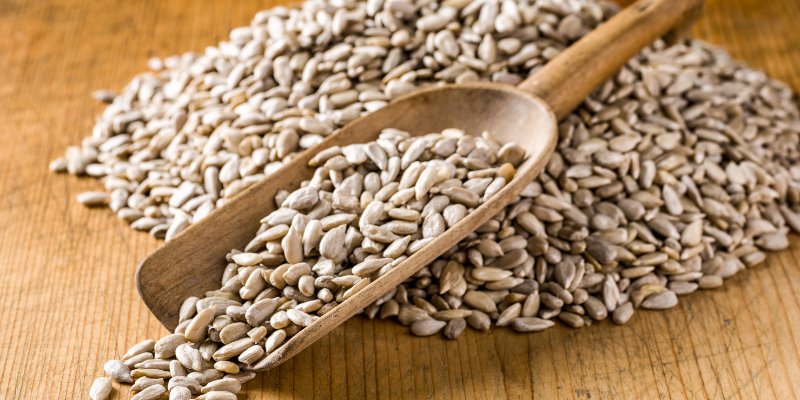Solar sunflower seeds are a popular snack and nutritional powerhouse. These tiny seeds provide health advantages and a balanced diet with critical elements. Our investigation on sunflower seed nutrition includes carbohydrate, lipid, protein, vitamin, and mineral levels. Healthy carbohydrates from sunflower seeds fuel the body. Sunflower seeds are good for regulating blood sugar since they include energy-giving carbs and fiber. Having a little of these lipids helps you eat well and stay healthy. Through sunflower seed nutrition, we learn that their adaptability goes beyond flavor, making them a great supplement to a healthy lifestyle.

Sunflower Seed Nutrition Facts:
Carbs:
Sunflower seeds are a good source of carbohydrates, which fuel human processes. While they include some natural sugars, sunflower seeds are high in nutritional fiber. This fiber supports regular bowel motions and balances blood sugar. Sunflower seeds are a healthy and filling option for mindful dieters because their balance of energy-releasing carbs and fiber sustains energy release.
Fats:
Seeds made from sunflowers are the most beneficial source of polyunsaturated fats as well as monounsaturated fats. Due to their capacity to lower LDL cholesterol, these unsaturated fats help protect the heart. The seeds of sunflowers are rich in fatty acids, which assist the brain's functioning and general wellness. Sunflower seeds in balance add to a balanced and heart-healthy diet.
Protein:
Plant-based protein from sunflower seeds provides a variety of amino acids needed for biological functioning. Vegans and vegetarians may acquire enough protein without animal products because of this protein content. For individuals wanting a well-rounded, plant-based protein supply, sunflower seeds' amino acids aid muscle repair, immunological function, and development.
Vitamins and Minerals:
Seeds include essential vitamins and minerals for good health. Vitamin E, a skin-nourishing antioxidant, protects cells from oxidative damage in sunflower seeds. Magnesium, crucial for bone and muscular fitness, is included in these seeds. The antioxidant defense mechanisms of sunflower seeds' selenium promote general health.
Sunflower Seed Health Benefits:
Immunity Booster:
Since they're rich in nutrients, sunflower seeds promote immunity. As an immune-boosting antioxidant, vitamin E is abundant in the sources. Vitamin E boosts immune cell synthesis, enabling disease resistance. These seeds also contain selenium, an immune-boosting trace element. Selenium helps enzymes fight viruses, bolstering the seeds' immunity-boosting credentials. Sunflower seeds boost immunity, protecting against common infections.
Immune-compromising oxidative stress is reduced by the seeds' antioxidants, particularly vitamin E and selenium, which neutralize free radicals. The body's natural defenses may be strengthened by adding sunflower seeds to a snack or meal.
Reduces Cholesterol:
Sunflower seeds reduce cholesterol, boosting heart health. Monounsaturated and polyunsaturated lipids in these seeds diminish "bad" LDL cholesterol. People may minimize their cardiovascular disease risk by eating sunflower seeds. This cholesterol-lowering impact helps control or avoid cardiac complications.
Moreover, sunflower seed fiber reduces digestion and cholesterol absorption. As a gel, soluble fiber binds to cholesterol and helps eliminate it. A balanced diet with sunflower seeds may help preserve cardiovascular health due to this dual-action mechanism.
Cardioprotective Effects:
Other than lowering cholesterol, sunflower seeds have several cardioprotective benefits. Sunflower seeds reduce oxidative stress, a risk factor for cardiovascular disease. Antioxidants neutralize free radicals, strengthening blood arteries and avoiding atherosclerosis. Sunflower seeds reduce cardiovascular system inflammation, improve blood flow, and minimize the risk of heart-related problems.
The amino acid precursor of nitric oxide, which relaxes blood arteries and maintains appropriate blood pressure, is found in sunflower seeds. Vasodilation improves circulation and reduces cardiac strain. Sunflower seeds combine cholesterol-lowering, antioxidant, and anti-inflammatory qualities for a natural cardiovascular health boost.
Heart Disease Prevention:
Through risk factor reduction, sunflower seeds may prevent heart disease—cardiovascular health benefits from their cholesterol-lowering and blood-pressure-regulating effects. Sunflower seeds' mono- and polyunsaturated lipids decrease LDL cholesterol, decreasing the risk of plaque, heart attack, and stroke. Supplementing a heart-healthy diet with these seeds may help preserve heart function.
Sunflower seed fiber has two heart health benefits. It aids in controlling weight by regulating blood sugar and promoting satiety. Inconsistent blood sugar levels might cause cardiovascular issues. Thus, stable levels are essential. Accordingly, sunflower seeds' nutritional profile and capacity to decrease cholesterol, blood pressure, and blood sugar make them a flexible and heart-healthy complement to a balanced diet.

Diabetes Management:
By regulating blood sugar, sunflower seeds help manage and prevent diabetes. Sunflower seeds support blood sugar stability with fiber, healthy fats, and protein. They are helpful for people with diabetes or those trying to maintain their blood glucose levels. The gradual energy release and fiber content of sunflower seeds avoid blood sugar spikes and provide a consistent energy source.
Sunflower seed lipids also enhance insulin sensitivity, helping the body use insulin more efficiently. Considering obesity is a risk associated with diabetes, this becomes significant. They're a delightful and healthy way to boost metabolic health, making sunflower seeds a good option for diabetes management or prevention.
Inflammation Reduction and Sickness Prevention:
Inflammation is reduced by sunflower seeds, improving general health. Eat sunflower seeds to reduce chronic inflammation, which may lead to many disorders. Vit E and selenium neutralize free radicals and reduce oxidative stress as antioxidants. Supports general health and prevents inflammatory chronic illnesses.
Sunflower seeds' vitamins and minerals boost the body's defenses, making our bodies more resistant to illnesses. Vitamin E, the mineral zinc and selenium in sunflower seeds, promotes immune cell development. As a crunchy salad garnish, blended into meals, or eaten as a healthy snack, sunflower seeds are a tasty and varied way to promote health. Sunflower seeds are more than a diet choice—they promote health and resilience.
Conclusion:
Finally, the sunflower seed is a nutritional powerhouse with a balanced diet of carbs, lipids, proteins, vitamins, and minerals. Beyond food, these seeds improve health. They provide several advantages, including immune system support, cholesterol reduction, and cardioprotection. Bases made from sunflowers enhance fitness as a food of ingredient thanks to their nutritional value.
The sunflower seed is a small but powerful ally in the ongoing study of nutrition and health. Our versatile and nutrient-dense seeds are a simple yet effective method to improve your nutrition. We satisfy hunger and nourish our bodies with each handful of sunflower seeds, proving that nutritious eating can be a delicious and easy way to well-being.




